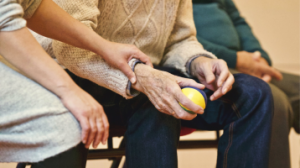
In France, there are 40 new cases of Parkinson’s daily. This degenerative disease comes just behind Alzheimer’s and is the second leading cause of motor disabilities behind strokes. It is normally diagnosed around the age of 58, but in 17% of cases, the disease begins before the age of fifty. Once detected, the disease progresses at variable rates. So far, there are treatments that reduce the symptoms, but none cure the disease. The disease is characterized by the gradual disappearance of neurons from a specific region at the base of the brain that makes dopamine. Dopamine is an indispensable neurotransmitter used in the coordination of body movements, mood and waking mechanisms. But the problems are not limited to this region, there are repercussions in the production of norepinephrine, serotonin, acetylcholine and GABA.
Are there things that can be done to avoid or reduce the chances of developing the disease?
Sleep well.
Having a restful sleep is important for everyone, but it is especially important for people who may be suffering from Parkinson’s. Are your nights restless, and you live your dreams as if they were real? There may be a problem.
Drink coffee.
If you drink coffee in moderation, you could reduce your chances of developing the disease. But limit your daily intake to 3 or 4 cups of coffee.
Iron and calcium could be a problem.
According to research, these two minerals may play a role in the onset of the disease. But as they are equally essential, we are talking here about moderation. Limit red meat and dairy products.
Take care of your intestinal flora.
Scientists have established a link between digestion and Parkinson’s disease. So, eat a balanced diet and include dietary fiber and lacto-fermented foods such as kimchi, kefir or raw sauerkraut. Avoid refined and industrial foods and fast acting sugars that deplete the diversity of intestinal flora.
Healthy eating.
Favor antioxidant vegetables such as beets, onions, peppers, cabbage, spinach, tomatoes, eggplants, potatoes, etc. Eat fruits such as strawberries, blueberries, raspberries, blackberries, oranges, grapes, plums, bananas, etc. Add spices such as ginger, turmeric and cinnamon. Include whole grains and reduce your consumption of red meat and deli meats. Finally, a diet without gluten, corn and dairy products is beneficial for people with the disease. Why not start now?
Physical activity.
A minimum of 30 minutes of fast-paced walking should be part of your daily routine. High intensity exercises such as cycling, weight training, running, etc. practiced three times a week are excellent, and are part of any program when people have the disease. Better start now.
Anti-Parkinson’s food supplements.
Vitamin D, NAC (N-acetylcysteine) and mucuna or mascate peas are all supposed to be very good supplements to prevent or slow down the disease.
For more details, read the full article on the subject in French written by Annie Casamayou in the June 2018 “Alternatif bien-être” magazine (No 141) entitled: “Stratégie anti-Parkinson : tout pour éviter la pandémie annoncée”.
If you liked this article, maybe you’ll also enjoy:



